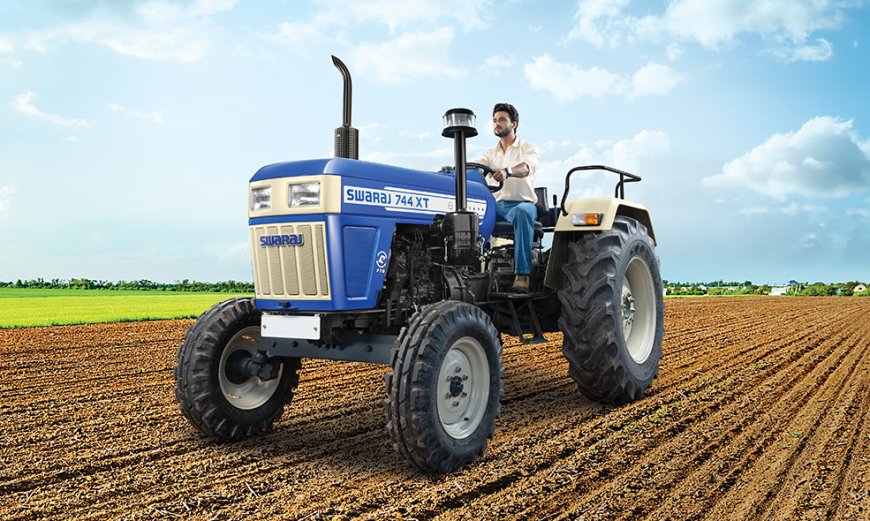Waste Management and Recycling on the Farm
Powerful reusing and waste management are fundamental to sustainable cultivation

Powerful reusing and waste management are fundamental to sustainable cultivation. By implementing these measures, farmers may lessen their influence on the environment and enhance soil health and productivity. This article will examine effective practices for handling and recycling agricultural waste. Also, it will cover how equipment like the Swaraj Tractor may help with these procedures.
Understanding Farm Waste
Farm waste may take many different forms, such as organic waste, animal dung, and crop leftovers. Plastic and chemical waste are also common. Properly managing these wastes is essential. Ineffective disposal can negatively impact farm output and the environment. On the other hand, farm waste recycling and reuse have several advantages.
Benefits of Waste Management
Effective waste management has many advantages. It lessens contamination and greenhouse gas emissions while further improving soil well-being. Feeding the soil with composting organic waste, for example, can increase agricultural production. Furthermore, reusing diminishes the requirement for manufactured manures, which recovers costs and improves the standard of cultivated land.
Methods for Waste Management and Recycling
There are multiple ways of reusing and handling farming waste. Each method has its unique benefits.
Composting
Composting is a natural process that turns organic waste into high-nutrient compost. Fields may become more productive and require less chemical compost when farmers use manure. The method of composting is easy and economical. Farmers can use materials such as agricultural leftovers, animal dung, and culinary scraps. Additionally, carbon and nitrogen-rich parts should be adjusted properly to prepare the soil.
Vermiculture
Utilizing worms to separate natural waste is known as vermiculture. The fantastic manure that results from this cycle is vermicompost, which contains beneficial bacteria and nutrients for yield and soil health. A vermiculture framework is easy to set up. Farmers need a suitable bin, bedding materials, and worms. Regular maintenance ensures effective waste decomposition.
Biogas Production
Reusing organic waste in the form of biogas is productive. Anaerobic digestion of organic molecules is a part of it. This procedure produces Digestate and biogas. One green energy source is biogas. Farmers may use it to heat their homes, cook, or make power. Digestive enzymes are useful fertilizers. They improve soil quality and encourage plant development. In addition, biogas systems can handle many types of organic waste. Crop leftovers and animal dung are examples of this.
Recycling Plastic Waste
Plastic waste is a significant issue on farms. It consists of irrigation lines, containers, and packing. Preserving the environment requires recycling unused plastic. Farmers may gather plastic garbage and send it to recycling facilities. They can also repurpose some plastic materials on the farm. For instance, used containers can serve as planters or storage bins.
Role of Machinery in Waste Management
Modern machinery plays a vital role in farm waste management. Tractors like the Swaraj 735 are essential tools. They help in various waste management tasks. These include transporting waste and preparing compost heaps. Moreover, the Swaraj 735 Tractor is strong and adaptable. It can manage difficult terrain and large loads. It can handle heavy loads and tough terrains. Investing in reliable machinery ensures efficient waste management. Additionally, the Swaraj 735 price is reasonable. It offers great value for its capabilities.
Case Study: Swaraj Tractors in Waste Management
Farmers using Swaraj tractors have reported positive outcomes. One farmer shared his experience with the Swaraj 735, highlighting its efficiency in managing farm waste. The tractor helped him transport manure and crop residues and assisted in spreading compost evenly on the fields. The Swaraj 735 price was affordable for his budget. It significantly improved his farm's waste management process.
Implementing a Waste Management Plan
Having a waste management plan is crucial. It ensures systematic waste handling and recycling. Here are some steps to implement an effective strategy.
Assess Waste Types
Identify the types of waste generated on the farm. This includes organic, plastic, and chemical waste. Understanding waste types helps in selecting appropriate recycling methods.
Set Goals
Define clear waste management goals, such as reducing waste volume or increasing recycling rates. Setting goals provides direction and motivation.
Allocate Resources
Allocate resources for waste management tasks, including workforce, machinery, and financial investment. Reliable tools like the Swaraj tractor are essential.
Monitor Progress
Monitor and evaluate the waste management plan regularly. This helps identify areas for improvement. Make the important changes to achieve the ideal results.
Conclusion
Effective reusing and waste management are vital for sustainable farming. They reduce environmental impact and enhance soil health. Also, techniques like treating the soil, vermiculture, and biogas creation are valuable. Recycling waste plastic is also necessary. Machinery like the Swaraj 735 tractor plays a significant role. It aids in various waste management tasks. Investing in reliable machinery ensures efficient waste handling. It is important to put a waste management plan into action. Additionally, it guarantees efficient and methodical trash management on the farm. Farmers may achieve sustainable and productive farming by implementing these techniques.












